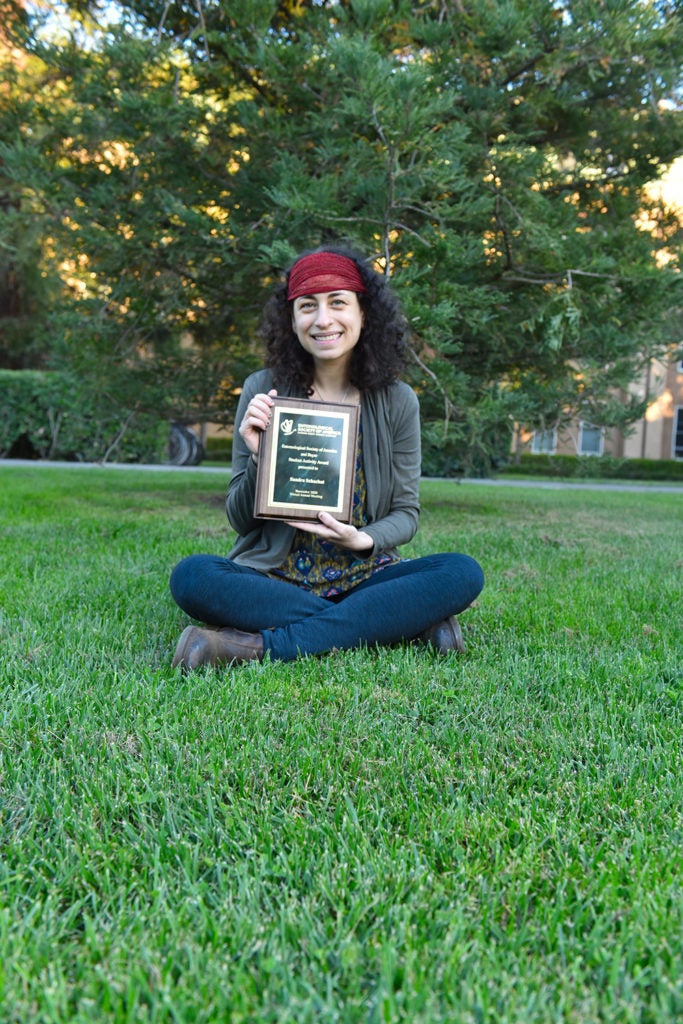Stanford student named 2021 Schmidt Science Fellow
Geological sciences PhD student Sandra Schachat has been selected for the fourth Schmidt Science Fellows cohort of postdoctoral fellows.
Stanford University geological sciences PhD student Sandra Schachat is among the 28 recipients of the 2021 Schmidt Science Fellowship. This postdoctoral fellowship supports early-career scientists committed to harnessing interdisciplinary science to make a positive difference in the world.

Sandra Schachat pictured with a previous award from the Entomological Society of America. (Image credit: Andrés Baresch)
Schmidt Science Fellows have pursued PhDs in the natural sciences, mathematics, engineering or computing and their post-doctoral placements represent a significant disciplinary pivot from their PhD topic.
“I’m amazed to have received this fellowship. It’s the opportunity of a lifetime,” said Schachat, who is in the School of Earth, Energy and Environmental Sciences at Stanford. “Before I found out about this fellowship, I already wanted to work on different scientific questions as a postdoctoral fellow but I wasn’t sure it would be possible to switch disciplines. It still feels a little bit unreal that this fellowship exists and that they chose me.”
Fellows are supported for at least one and up to two years with a $100,000-per-year stipend to fund both training and research. During the course of the program, they learn new research ideas and techniques, attend workshops and engage with leading thinkers in science, business, policy and society. They also receive tailored training in science communication, leadership and the facilitation of interdisciplinary research.
At Stanford, Schachat’s work focused on insect evolution over hundreds of millions of years, including their evolution of flight. This involved dissecting and photographing museum specimens, and coding statistical models. As a Schmidt Science Fellow, Schachat will switch to studying live specimens within much shorter timescales – days or weeks – and, specifically, plans to conduct experiments to evaluate the role of population density on insects’ mating choices.
“This research is important to me because it will help us understand declines in natural insect populations. Insects are an incredibly diverse group of animals with hundreds of millions of years of evolutionary history, and their importance to natural ecosystems and to human wellbeing cannot be overstated,” said Schachat. “Since I began my doctoral research at Stanford, more and more scientists have been sounding the alarm about possible insect extinctions, but we still know very little about why some groups of insects are threatened with extinction and others are not.”
The program is supported by Schmidt Futures, a philanthropic initiative co-founded by Eric and Wendy Schmidt, in partnership with Rhodes Trust. This year’s cohort was nominated by 19 institutions in eight countries and represents 13 nationalities. With the addition of the 2021 fellows, there have been a total of 84 Schmidt Science Fellows.
At Stanford, the Office of the Vice Provost for Graduate Education coordinates the selection of nominations, which are forwarded by individual schools and then reviewed by a committee of school representatives. Only a handful of nominees is submitted to the Schmidt Science Fellows program, which evaluates the nominations and invites a select number of students to apply.
Vivian Feig, PhD ’20, who is currently a postdoctoral research fellow at Harvard Medical School, is also among the 2021 cohort and was nominated from Stanford.